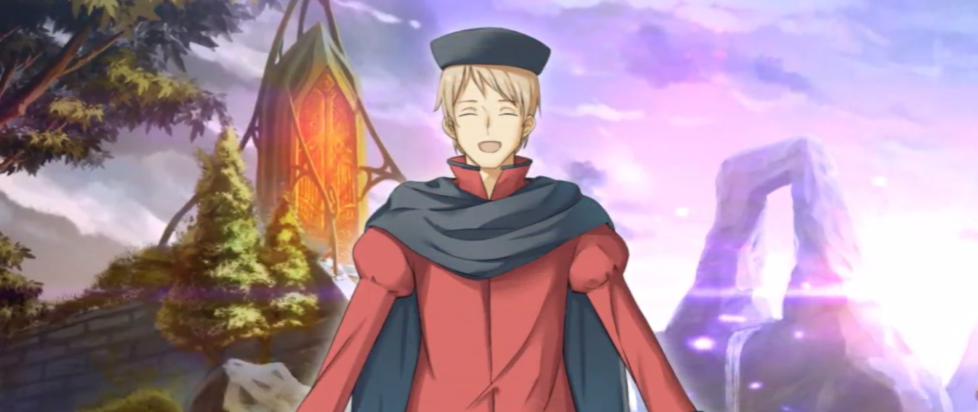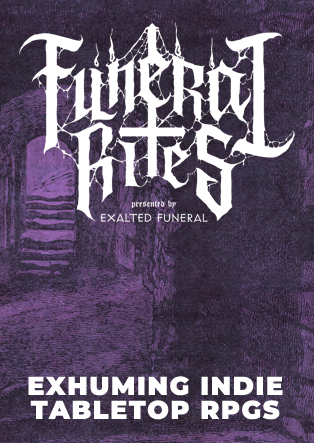
The Merchant Memoirs
The Merchant Memoirs is odd.
The Merchant Memoirs is a kinetic visual novel, meaning that you just read the story without making any choices. Some of my favorite VNs (like Juniper’s Knot or Narcissu) are kinetic, and not having to worry about choices or strategizing to get every CG in the VN usually allows you to sink completely into the story. Normally, kinetic VNs are designed so that a single coherent story unfolds around you, immersing you in the world as if you were reading a regular book. But it’s an odd choice for The Merchant Memoirs because the entire plot of this particular VN revolves around the main character attempting to make different choices to get a better outcome on his “second playthrough” of life.
The Merchant Memoirs follows Engel Smith, a merchant from a medieval-esque village who dies tragically at 41. He gets to heaven, where his guardian angel gives him a brief summary of his life (including how he was killed by barbarian hordes) before telling him to get ready to reincarnate. Engel doesn’t have the patience for her to set up the procedure properly, however, and rushes through the pearly gates of reincarnation before everything is ready. As a result, rather than reincarnating into a new person with no memory of his past life, Engel instead jumps back into his 20-year-old self with all the memories from his old life. Armed with knowledge of politics and market trends for the next two decades, Engel sets out to make a better life for himself this time around.
By this point, you can probably see the disconnect between the subject matter and the medium they used for a plot that’s literally about taking different actions in the same scenarios you experienced before. The story is constantly nudging the player with hints about what should be done now, what choices could be made at this exact moment and drastically alter the future, and even directly juxtaposes the tragic consequences of your good choices against whatever benefits you might reap. I knew going into this that The Merchant Memoirs was supposed to be devoid of choices that the reader could make, but there were so many times the language of the game was worded in such a way that I was convinced an option screen was going to pop up right then. If this had been a choice-driven VN, I would have at least praised it mechanically as a great introductory VN for being relatively short and teaching newbie readers the practice of save-scumming early on. But because there aren’t any choices to be made, it feels more like the VN is taunting you than trying to narrate Engel’s story.
Part of the issue might be that the story isn’t very good anyway. Engel believes his success is guaranteed thanks to his knowledge of the future, so he operates with an enormous amount of confidence from start to finish. It would have been nice to see how some of his decisions either didn’t pan out the way he wanted or produced side effects that he couldn’t have necessarily predicted and had to correct for later incidents in the story. Alternate histories or stories with time travel always focus on the dangers of the Butterfly Effect, because you never know the dangers of random chance or how altering one element can change world history (see the story of Hannibal losing his army in the Alps). Engel manages to change everything about his life, and it rarely alters anything beyond the surface level in the story. Engel stockpiles iron ore because he knows it will be more valuable during a coming war. He profits from selling it. Engel needs to make a contract with ambassadors and does so by blackmailing them. He gets the contract. Engel might meet his wife Natalie under different circumstances but still want to marry her. He creates a lucrative situation for them both, and they’re married. Even when he does things that have a farther-reaching effect (for example, pushing the king to produce war machines that drastically reduce the duration of a war) it never produces results that seem to affect Engel in anything but a positive way, usually in the form of enriching his pockets. Picture a story that’s nothing but the protagonist getting everything they could ever want, and you’ll have a good impression of the majority of my experience with The Merchant Memoirs.
To summarize, Afterthought has designed a VN about making new choices on a second go of things even though the reader can’t make any choices, and then fails to provide the reader with a story that’s interesting enough to make it worth not having any control over the choices the main character makes. Nothing is ever explored in any great detail, and the scenes all feel rushed and clumsily constructed, like they only exist because someone at the studio insisted they had to be in the final cut. For example, there is a scene where Engel has to go to the king’s court and negotiate the sale of his iron to the kingdom. The Merchant Memoirs never explains why this has to be handled in the king’s court before all the land, rather than taken care of by the bankers the king likely has employed to handle finances and contract negotiation. The VN builds up how important this moment is for Engel because it will be the start of him making his fortune, but the scene itself lasts less than 2 minutes. That’s it. Engel walks in, demands money, the king agrees. There’s no tension or time for the audience to wonder what might happen if things go horribly wrong. Engels was able to negotiate a supply contract in the same amount of time I’d need to order a soda at McDonald’s.
Further befuddling me, The Merchant Memoirs has a New Game+ mode that changes the story on a subsequent readthrough by altering a choice that Engel previously made. There are actually a few different endings to The Merchant Memoirs, based on the VN (not the player) redoing some scenarios when you start over. The majority of events in the story won’t change, but one or two minor things can make a world of difference at random. For example, in one readthrough you prevent a woman’s murder that occurs in another iteration of the story. No effect. In one iteration, you apologize for bumping into a woman and offering to buy her lunch as an apology, and in a different one you keep silent. This single change results in the complete upending of the country’s market by flooding it with gold coins at a higher purity than what is commonly used. This kind of drastic alteration of the course of events in a story would be something I’d expect from a VN where a single bad choice can put you on the worst route, and again, I find it very confusing that The Merchant Memoirs was released as a kinetic VN since the studio went ahead and wrote a branching storyline for it anyway. It’s so weird to emphasize the importance of choice and subsequently design a story with dozens of different choices that the main character has to make, only to force the reader to walk through them all in random order instead of allowing you to actually make those choices.
The one thing that never changes, however, is the insufferability of the main character. I’m pretty sure that The Merchant Memoirs wants you to cheer for Engel, but I personally found him to be an unbearable borderline sociopath. Remember that woman’s murder I mentioned earlier? In one route, Engel lets her die knowing that she is going to be murdered so he can use her death as blackmail to fund his initial investments. Engel decides to profit from a coming war not only by stockpiling iron that he knows the army will need, but also by drawing up contracts to produce flamethrowers to be used on barbarian hordes for a war that Engel himself admits is probably just to distract people from issues in the capital. It’s only thanks to his guardian angel that Engel succeeds in getting the initial money he needs for the iron investment, but when she’s booted out of heaven he calls her a freeloader and tries to dump her on the streets. He’s selfish, ignorant, childish, and completely indifferent to the fact that he makes his personal fortune via financing the murder of hundreds, if not thousands, of innocents.
At the end of reading through all the different routes, I came away with mixed feelings. This VN definitely wasn’t good, but I’ve seen much worse. The Merchant Memoirs is a kinetic VN that feels like it either should have been written with a single route containing a more fleshed-out story and relatable characters, or redone as a choice-driven VN with a story that the reader felt in control of. What you’re actually left with is a lackluster hybrid of both. As for the rest of it…the art’s nice, the music’s not, I can take or leave all the other characters. Nothing about this VN really sticks out to me one way or another. It’s a plain slice of sandwich bread in the kitchen of life.
The Merchant Memoirs is on Steam for $3. I really don’t recommend it, and a year from now I probably won’t even remember reading this. Take that as you will.





